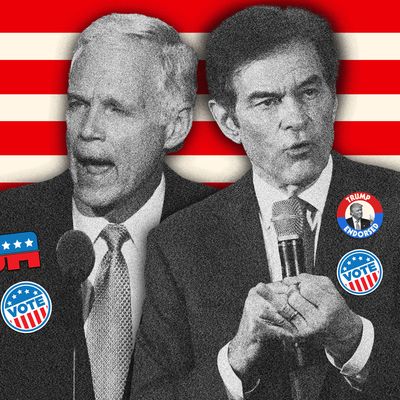
As races determining control of the Senate tighten up in the final weeks before the midterm elections, Republican candidates are turning to a tested ad-campaign strategy: making Democrats look soft on crime. While voters throughout the country tell pollsters that crime is a major issue on the ballot, this approach is particularly clear in states such as Wisconsin and Pennsylvania.
Wisconsin senator Ron Johnson — who has been unpopular in the state for years thanks in part to his historically stupid pandemic rhetoric — has been gaining in polls against Lieutenant Governor Mandela Barnes after hitting him hard on rising crime rates in cities such as Milwaukee, where homicides are up 40 percent over the previous year. Ads for Johnson have often focused on an interview Barnes gave in 2020, weeks after the murder of George Floyd, in which the Democrat repeated a tenet of the “defund the police” movement. “We need to invest more in neighborhood services and programming for our residents, for our communities on the front end,” Barnes said then. “Where will that money come from? Well, it can come from overbloated budgets in police departments.” Barnes and his campaign have repeatedly insisted he did not and does not support defunding the police.
Some Wisconsin Democrats are upset that Barnes, in their view, left his flank open to an obvious attack on an issue that the party has deemed toxic. “It’s probably frustrating for the other candidates as well because we invested so much time, so much money in beating Ron Johnson. If we didn’t have that set of values, if we didn’t have that shared goal of beating Ron Johnson, we wouldn’t have bailed out,” Tom Nelson, a Democrat who dropped out of the Senate primary, told NBC News.
The ads have also centered on Barnes’s push as a state representative to end cash bail. They feature Darrell Brooks, a 39-year-old Black man who killed six people when he drove his car through a Christmas parade in Waukesha last year days after getting out of jail on $1,000 bail for a domestic-assault charge. (Brooks pleaded not guilty to criminal charges and is currently on trial.) “Barnes still wants to end cash bail today,” the ad concludes, calling him a “dangerous Democrat” and placing his picture alongside the progressive Squad in the House. It would be hard to ignore the racial overtones of the campaign given that Barnes is the first Black major-party candidate for Senate in Wisconsin history.
The spot — blaming a candidate for a crime committed by a Black man recently released from jail — has some similarities with the infamous 1988 Willie Horton ad, which describes the rape of a woman by a convicted murderer on a “weekend pass” from a Massachusetts prison. It suggested that a furlough program under Governor Michael Dukakis (modeled on one by Ronald Reagan in California) was to blame for the attack. The ad bore the fingerprints of George H.W. Bush’s hatchet men and helped cut down Dukakis in the general election.
In Pennsylvania, Republican Mehmet Oz is currently shaming Democrat John Fetterman’s campaign for employing two Black former convicts. In the online “Inmates for Fetterman” campaign, he criticizes Fetterman for employing brothers Lee and Dennis Horton (unrelated to Willie Horton) after they were granted clemency last year after being wrongfully convicted of murder in 1993. Oz has also attacked Fetterman for overseeing a large increase in the number of inmates granted clemency when he served as the chair of the Board of Pardons as lieutenant governor. In September, the Oz campaign reportedly paid men to dress up in orange jumpsuits and hold up “Inmates for Fetterman” signs at campaign events.
With crime rates rising in Philadelphia, Oz and political-action committees supporting his candidacy have painted Fetterman as “dangerously liberal on crime” with 71 percent of pro-Oz ads focusing on crime in the past two months, according to the Cook Political Report. And whether it’s from the inevitable tightening of a high-profile swing-state race or the millions of dollars in ads depicting Fetterman as an overzealous criminal-justice reformer, polls now suggest a much closer race than those just paying attention to the Democrat’s Twitter jokes may have anticipated.






























